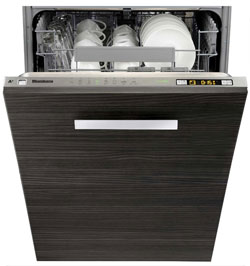Using your Dishwasher
As with all domestic appliances, the best practice to avoid the need for repairs is to follow a few simple rules.Basic use of the dishwasher

The best use of a dishwasher, from an energy saving point of view, is to fully load it in the correct racks, but don't stack it in and overfill it (as this will result items not being cleaned properly and the need to run the dishwasher on another cycle).
Leave gaps around the plates, cups and other cutlery, pots and pans, etc. so the water jets can disperse the water and move the detergent around the washer as per the manufacturer's design (the user manual will have loading advice, so make sure you have a read before you start).
Place big items, such as roasting pans face down, and at the back and sides of the dishwasher, again to allow the spray arms to get to the tough baked on food and to keep them away from the other crockery and cutlery – make sure the large items do not block the water from other items in the dishwasher.
Simple, but you'd be surprised hopw many times people end up with far from sparkling clean kitchenware and have to start all over again.
And one last thing... Rinse and scrape the food before loading them into the dishwasher.
General Dishwasher care and maintenance
1. Run a service wash
As with a washing machine (see general maintenance of your washing machine) it is important to run a service wash on a dishwasher, i.e. run the dishwasher on a hot wash every 6months or so to avoid the build up of grime and bacteria, and the arrival of bad odours. Do this without anything in it.
2. Check the filters
The dishwasher filter is designed to catch the unwanted bits of food and grease. Make sure both the inner filters and the outer filters are cleaned with hot water. This should be done regularly, depending on how often you use the dishwasher. Average dishwasher use would require a weekly clean.
3. Your dishwasher has spray arms are responsible for jetting the water around your machine. Make sure these are cleaned and free from food debris. Clear the holes and rinse thoroughly. Every 3 to 6 months will suffice.
4. Clean the seals around the door.
The basic premise here is to stop any build up of food in and around the door seal. If this isn't regularly wiped clean, the seals will wear away and cause the dishwasher to leak.
5. Use the correct detergents
The use of Rinse aid and salt is paramount in allowing the dishwasher to work to its full potential. Do not ignore the warning lights, and keep the levels up. Salt helps keep limescale from building up, and allows the detergents to work correctly by softening the water. Rinse aid gives your glasses and plates that 'sparkly clean' effect and stops streaking.
